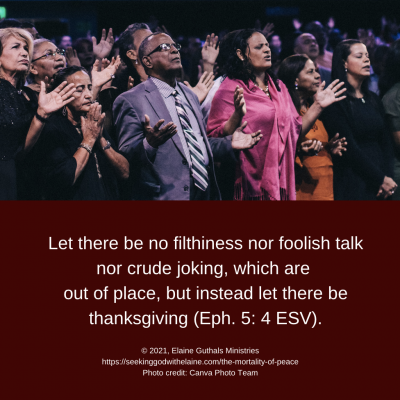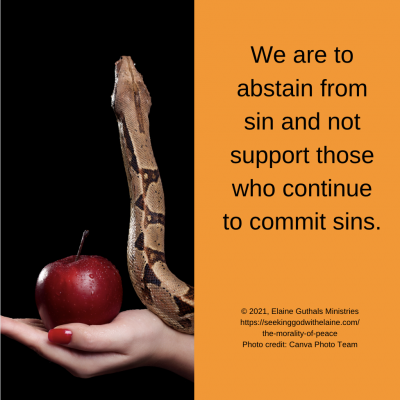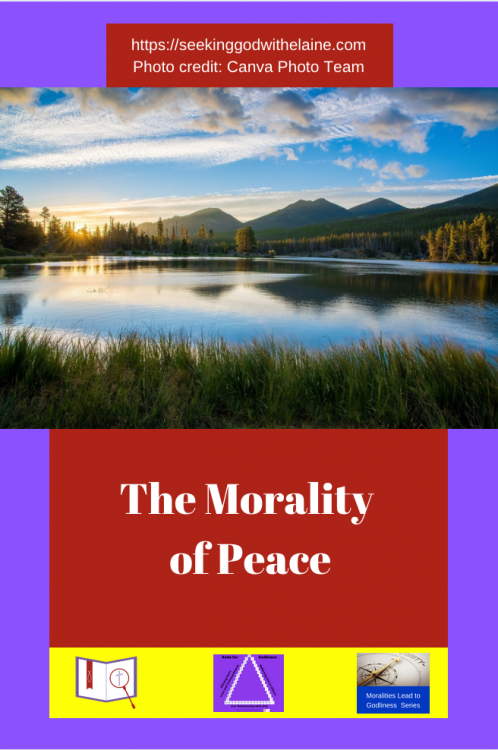When we choose right over wrong, we gain peace. This daily devotional looks at how peace comes within when we avoid sin.
Nuggets
- Inner peace is fostered by what comes out of us.
- Inner peace stems from our avoidance of sin, even secret sins.
To read devotions in the Redo for Godliness series, click the appropriate button below.
Devotions in the Moralities Lead to Godliness series

We’ve been stepping through Manton’s sermon entitled The Moralities of Christianity to see what we can glean to aid us in redoing our character. We’ve come to an interesting section. Manton wrote, “Peace. Nothing obscene or unchaste should be seen or heard from a Christian.”
Resources
Hmmm. Our speech is not exactly what we think of first when we think of peace. I can’t wait to see what verses Manton uses for backup.
Let's Put It into Context
“Finally brothers and sisters, whatever is true, whatever is honorable, whatever is just, whatever is pure, whatever is lovely, whatever is commendable — if there is any moral excellence and if there is anything praiseworthy — dwell on these things” (Phil. 4: 8 CSB)
The definition of moral, according to the Merriam-Webster Dictionary, is “of or relating to principles of right and wrong in behavior.” Morality, then, is “a doctrine or system of moral conduct.” When it is the plural form — moralities — it is a “particular moral principles or rules of conduct.”
Resources
Our morals determine our character. Character, according to the Merriam-Webster Dictionary, is “the complex of mental and ethical traits marking and often individualizing a person, group, or nation.”
Resource
Peace is a fruit of righteousness manifested in an inward tranquility resulting from a balanced life with spiritual order, equity, and truth that implies cooperation, humility, integrity, communication, and cohesiveness.
Watch Your Mouth!
“No foul language should come from your mouth, but only what is good for building up someone in need, so that it gives grace to those who hear” (Eph. 4: 29 CSB)
Inner peace is fostered by what comes out of us.
Our words are very important. I wonder, though, if we realize how impactful they can be on our sense of peace.
Heygate gave a good description of what our words are. He wrote, “They are results: the completion and effect of certain passions and states of feeling.” They are an outward view of what we are feeling inside.
Resource
We know that God wants us to guard our speech.
- Set a guard, O LORD, over my mouth; keep watch over the door of my lips! (Ps. 141: 3: ESV).
- Let there be no filthiness nor foolish talk nor crude joking, which are out of place, but instead let there be thanksgiving (Eph. 5: 4 ESV).
- Too much talk leads to sin. Be sensible and keep your mouth shut (Prov. 10: 19 NLT).
- But I tell you that everyone will have to give account on the day of judgment for every empty word they have spoken. For by your words you will be acquitted, and by your words you will be condemned (Mt. 12: 36-37 NIV).
- But no man can tame the tongue. It is an unruly evil, full of deadly poison (Jas. 3: 8 NKJV).

Yeah, I know. Sometimes, we can do okay with guarding our speech. Sometimes, we can’t.
That is especially true with our self-talk. Heygate points out how easy it is to go from peace to anger just by working ourselves up in our minds.
Resource
Rogers identified the foul language as profanity and indecent talk. He also cautioned we should not talk against God and our neighbors. Jortin identified that as talking derisively about God, ridiculing His ways. Instead of talking about our love of God and His ways, we talk about how we love worldview things.
Resource
We should make our conversations count. God expects us to tell others of the good He is going in our lives. We should use our words to build people up — not just give prideful, selfish discourses of ourselves.
Our humor has to be appropriate. It shouldn’t be derogatory humor and banter.
Instead, too many times our words tear down our witness. Worldview people can have high expectations of disciples. They may expect a 100% toeing the line — but a worldview line.
Stay Away from Sin!
“Don’t participate in the fruitless works of darkness, but instead expose them. For it is shameful even to mention what is done by them in secret” (Eph. 5: 11-12 CSB)
Inner peace stems from our avoidance of sin, even secret sins.
Manton didn’t include verse 11 in his argument that guarding our conversations promoted peace. I thought we needed it for context.
Paul first cautioned us about staying away from “… the fruitless works of darkness …” (Eph. 5: 11 CSB). In another place, he identified that as “… sexual immorality, impurity, passion, evil desire, and covetousness, which is idolatry” (Col. 3: 5 ESV).
Manton contended that there were several reasons they are considered works of darkness — a.k.a. sin.
- They are done apart from God.
- Satan uses them to tempt us.
- They won’t stand up under scrutiny in the Light.
- Those participating in unforgiven acts of sin are doomed to eternal darkness — a.k.a. hell.
Resource
Did you catch that? The command goes beyond performing the acts of sin. “… it is shameful even to mention what is done by them in secret” (Eph. 5: 11-12 CSB).
Don’t do it, and don’t talk about it.
Manton warned that talking about sin could be construed as an attempt to “… counsel, persuade, allure, or entice others to sins.” We want to make sure our beliefs are not twisted.
Resource
God does not want us to condone sin. We are to reprove, rather than approve, sin. According to Manton, He wants us to
- Do God’s Will.
- Love God and follow His laws and commandments.
- Watch the company we keep.
- Keep in communication with God.
Resource
In a different sermon, Manton addressed secret sins. He wrote that “… all sense of right and wrong, good and evil, is not wholly extinguished in the heart of man; for here the unbelieving Gentiles, though they did abominable things, yet they did them in secret, which showeth some relics of natural conscience and shame in them.”
Resource
Elaine-speak. We do things in secret because we have a conscience and see the shame in our actions because we do know good from evil.
Because we have been called into the Light, we see what sin is. Sins are actions by humans that disobey God and break one of His reasonable, holy, and righteous laws and commandments, goes against a purpose He has for us, or follows Satan’s promptings.
We have to realize that nothing is secret from God. He is all-seeing and all-knowing. We see the sin exposed.
To read a related devotion, click on the appropriate button below.
Instead of showcasing the sin, we need to reflect the Light. We need to ask forgiveness for all of our sins. “But who can discern their own errors? Forgive my hidden faults” (Ps. 19: 12 NIV).
Let’s come at this from another direction. The “don’t participate in …” (Eph. 5: 11 CSB) was translated as “have nothing to do with …” (Eph. 5: 11 NIV) and “And have no fellowship with …” (Eph. 5: 11 KJV).
Pritchett reminded us that the intent here was not to eliminate our contact with those who sin. We are called to witness to those who need God’s forgiveness. This contact could be within our families, our workplace, or throughout our daily walk.
We are to abstain from sin and not support those who continue to commit sins. We are not to change a sin into an acceptable action.
Resource

Making the Connections
We have to remember that God hates every sin. There are not different degrees of sin. All have done one thing: broken an express law, commandment, or directive from God. In reality, lying is just as bad as murder.
- “Do not steal or cheat or lie” (Lev. 19: 11 GNT).
- “Do not commit murder” (Ex. 20: 13 GNT).
Rogers reminded us that worldview people don’t always try to convince us to give up our relationship with God. They just try to limit our witnessing to them. They want us to bury it when we are around them.
Resource

How Do We Apply This?
- Repent and turn away from sin.
- Don’t lead others into sin by teaching or tempting them or condoning the sin (i.e., don’t tolerate sin).
- Don’t provoke other into sin.
- Don’t abdicate our job of reproving the sins of others.
- Instead, imitate God.
- Watch our language.
- Don’t lie to deceive others.
- Learn to be silent.
- Pick our friends wisely.
Resource
We gain peace when we are doing God’s Will. He wants us to remain pure in all ways.
Father God. Lord, we see so many ways that we are not pure. Help us to refrain from sin. Show us any hidden sins so that we may repent and turn from them. Sovereign God, we want to have Your character. Amen.
What do you think?
Leave me a comment below (about this or anything else) or head over to my Facebook group for some interactive discussion.
If you don’t understand something and would like further clarification, please contact me.
If you have not signed up for the email daily or weekly providing the link to the devotions and the newsletter, do so below.
If God has used this devotion to speak with you, consider sharing it on social media.
Pingback: The Morality of Diligence – Seeking God with Elaine
Pingback: The Morality of Having a Sober Character – Seeking God with Elaine
Pingback: Honoring God with Our Lives – Seeking God with Elaine